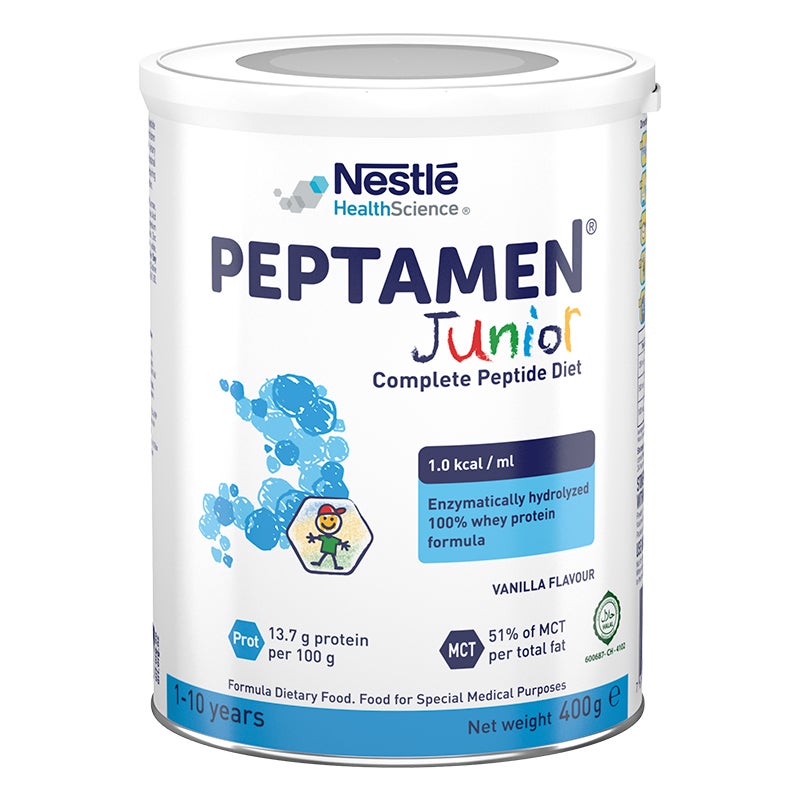- Nestlé Health Science
- Our expertise
- Pediatrics
- Pediatric Gastrointestinal (GI) impairment
Pediatric Gastrointestinal (GI) impairment
Gastrointestinal (GI) impairment can range from reflux to constipation, and vary greatly in terms of severity and timescale. What is sure, however, is that appropriate nutritional therapy can play a key role in improving the overall condition and quality of life of the child.
Pediatric gastrointestinal impairment refers to a range of disorders that can affect any part of the digestive tract, from the esophagus and stomach to the small intestine, colon and rectum.2 Common GI disorders that cause impairment include: gastro-esophageal reflux (GERD), acute or chronic diarrhea, constipation and cow or soy milk allergy/intolerance. Although it can be concerning, in many cases, the symptoms associated with these disorders can be managed with nutritional therapy alone, for example in the case of GERD.1,2,4
The GI tract is responsible for the digestion of the food we eat. When children suffer from GI impairment, there is often a risk for malabsorption or maldigestion, which may lead to nutritional deficiencies.3It is for this reason that a specific focus is placed on the nutritional status of these children, as optimum nutrient intake has been shown to support normal growth and development as well as improve the overall condition. For example, with children in critical care, appropriate nutrient intake is linked to a better recovery and shorter length of hospital stay.3
At Nestlé Health Science, we are committed to providing nutritional therapies that are tailored to the individual needs of the child. In the case of infants and children with GI impairment, these needs are very specific to the condition, which is why we have a range of different solutions to fulfil a variety of nutritional requirements, and an optimized taste to facilitate acceptance.
- http://s3.gi.org/patients/gihealth/pdf/pediatric.pdf Accessed December 2014.
- http://www.theportlandhospital.com/children/specialties/gastroenterology/. Accessed December 2014.
- http://www.nestlenutrition-institute.org/News/Pages/Nutritional-management-of-children-with-gastrointestinal-Impairment%E2%80%93key-to-clinical-outcome.aspx. Accessed December 2014.
http://www.niddk.nih.gov/health-information/health-topics/digestive-diseases/ger-and-gerd-in-infants/Pages/facts.aspx. Accessed December 2014.
Reflux affects over 50% of all babies in the first 3 months of life.1
The good news is that the symptoms of GERD can often be reduced with feeding changes.
http://www.niddk.nih.gov/health-information/health-topics/digestive-diseases/ger-and-gerd-in-infants/Pages/facts.aspx. Accessed December 2014.

FOLLOW NORMAL BEDTIME ROUTINES 1
Sleep is key both for infants and their parents. Establishing a normal bedtime routine and following it nightly plays an important role in getting adequate sleep. In infants with gastro-esophageal reflux disease (GERD), rocking them to sleep in an upright position can help soothe them and minimize symptoms.
http://www.healthline.com/health/gerd/infants-sleeping. Accessed December 2014.

KEEP THINGS MOVING 1
All kinds of things may cause constipation in children. It could be potty-training stress, lack of fluids or poor bowel habits among others. If, however, a child has not had at least one bowel movement every other day, or if movements are painful and more than normal pushing is needed or there is blood in the stool, it may be worth going to see a paediatrician.
http://www.webmd.com/children/features/digestive-doctor. Accessed December 2014.

ALWAYS SEEK ADVICE1
Digestive symptoms such as diarrhea, constipation or reflux are common in children and are often harmless. It is understandable that changing their diet is often the first port of call. If symptoms last longer than usual or if weight loss occurs, however, it is important to seek medical advice before making any significant changes to a child’s diet.
http://www.webmd.com/children/features/digestive-doctor. Accessed December 2014.

